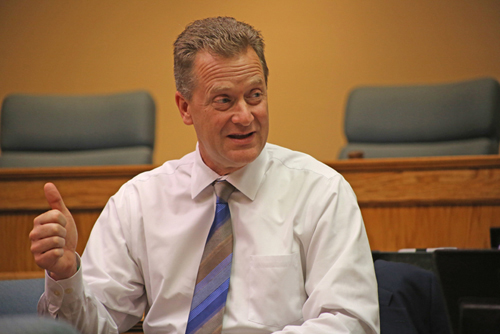Riverhead Supe wants to ensure prayers said before board meetings


Riverhead Supervisor Sean Walter is looking to ensure the Town Board continues the tradition of having an invocation or prayer before each regular meeting after he leaves office in January, and plans to offer a resolution to that effect at Tuesday’s meeting. The supervisor-elect is not sure that’s necessary.
The resolution that will likely be considered Tuesday shifts responsibility for compiling and maintaining a database of local clergy from the supervisor’s office to the town council office. He said Councilman Jim Wooten has indicated a willingness to do so.
Mr. Wooten was absent from Thursday’s Town Board work session where the issue was discussed, but Councilwoman Jodi Giglio and John Dunleavy said they had no problems with the move.
“It’s a very civil way to start the meetings,” Ms. Giglio said.
“You never go wrong when you can invite God into the room,” Mr. Walter said.
Councilman Tim Hubbard said he would want to see how the newly elected board members, Supervisor-elect Laura Jens-Smith and Councilwoman-elect Catherine Kent, felt about it. They will replace Mr. Walter and Mr. Dunleavy, respectively, next year.
Ms. Jens-Smith said afterward by phone that she does not have a problem with having an invocation before a meeting, but she does not feel it should be something required by resolution.
Ms. Kent could not be immediately reached for comment.
The resolution up for vote on Tuesday says the database “shall be compiled using reasonable efforts” to identify all churches, synagogues, congregations, temples, mosques and other religious assemblies in the town, and that the Town Board, in December of each year, “shall mail an invitation to the leader” of each entry in the database and inviting them to participate.
The board first adopted the practice in August of 2010, after Mr. Walter brought it up in January of that year. Since then, the board generally has a local preacher read a short prayer before each meeting. While there was a mixed reaction when it was first suggested, there has not been much controversy since.
In March of 2015, the board adopted by resolution a formal policy for the invocations, which cited a 2014 U.S. Supreme Court ruling validating prayers at public meetings.
“Legislative prayer lends gravity to public business, reminds lawmakers to transcend petty differences in pursuit of a higher purpose and expresses a common aspiration to a just and peaceful society,” the court wrote in its decision.








